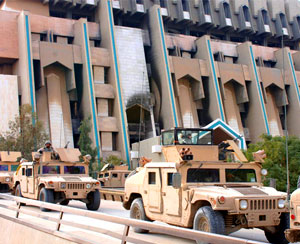ASKIAM
Senior Correspondent
- Iraq War 5 years later: No end in sight (FCN, 04-03-2008)
- Five years on.. An Iraqi journalist looks back (ElectronicIraq.net, 03-20-2008)
- The greatest foreign policy blunder since Vietnam (FCN, 01-26-2007)

WASHINGTON (FinalCall.com) – President George W. Bush has effectively passed the Iraq war quagmire on to his successor. The “post surge” testimony on Capitol Hill April 8 and 9 by the top U.S. military commander, General David Petraeus, virtually sealed the deal. He recommended a suspension of troop withdrawals from Iraq after July, thus freezing the number of American troops well into the fall at close to 140,000.
That number is more troops than before the so-called “surge.” Gen. Petraeus testified before the Senate and House committees alongside Ambassador Ryan Crocker.
“We all knew what Petraeus was going to say, that he was going to come there and say, well, we can’t draw down troops, but the corporate media treats it as this is some sort of dramatic breaking news, because I think what Petraeus’s real goal is to ensure that the occupation continues unhindered until January of 2009,” Arun Gupta, an editor of The Indypendent, a bimonthly newspaper based in New York said recently on Pacifica’s Democracy Now!
“What the Bush administration’s goal at this point and what it really has been for the last few years is to pass off a raging occupation to the next administration,” Mr. Gupta continued, “because it’s going to make it harder for them to withdraw when you have 140,000 U.S. troops, 180,000-plus mercenaries and private contractors, the largest U.S. embassy in the world and enduring U.S. military bases all throughout Iraq.”
Meanwhile, a confidential draft agreement covering the future of U.S. forces in Iraq, shows that “provision is being made for an open-ended military presence in the country,” according to The Guardian.
The draft strategic framework agreement between the U.S. and Iraqi governments was dated March 7 and marked “secret” and “sensitive.” It is intended to replace the existing UN mandate and authorizes the U.S. to “conduct military operations in Iraq and to detain individuals when necessary for imperative reasons of security” without time limit.
Iraqi critics claim the agreement contains no limits on numbers of U.S. forces, the weapons they are able to deploy, their legal status or powers over Iraqi citizens, going far beyond long term U.S. security agreements with other countries. The agreement is intended to govern the status of the U.S. military and other members of the multinational force.
Both Democratic Presidential candidates–Senators Barack Obama (D-Ill.) and Hillary Clinton (D-N.Y.)–may have already signed off on the policy.
“On the campaign trail, the two candidates often speak of bringing the troops home and ending the war, and Democratic primary voters, 80 percent of whom want U.S. troops out of Iraq within 12 months, reward them with boisterous applause,” writer Joshua Holland said in a statement to the Institute for Public Accuracy.
“Both Clinton and Obama have been very clear–in the fine print–about the fact that they will leave a significant number of ‘residual forces’ in Iraq, albeit with a more limited mission than the Bush administration has pursued.
“For example, Obama has played this trick of calling for the removal of all ‘combat troops’ in 16 months; what the campaign doesn’t highlight is that it plans to leave ‘non-combat troops,’ but the idea of ‘non-combat’ troops in Iraq makes no sense. Also, the campaign is backing off of the 16 months pledge,” said Mr. Holland.
“All three of the major U.S. candidates for president have Iraq plans that would continue the occupation for the foreseeable future,” author Jeremy Scahill said in a broadcast interview. “(Sen.) McCain clearly would continue the Bush policy, but both Obama and Clinton have plans that would maintain some of the largest encampments of the occupation–the Green Zone, the monstrous U.S. embassy, U.S. control of the Baghdad airport.
“Additionally, the Democratic candidates speak of maintaining a U.S. ‘strike force’ in Iraq and surrounding countries. In all, this could mean as many as 60,000-80,000 troops in Iraq for many years to come. On top of this, both Democrats have plans that would maintain a massive force of so-called ‘private contractors’ to support their Iraq policy. They are misleading their supporters when they passionately denounce the war and profess to support bringing it to an end. At best, what Obama or Clinton are offering is a scaled-down occupation–but still a sizable one–rebranded as a different mission.
Some former military leaders question the war’s mission, not just it’s execution. “It’s a hell of a mess. I mean, you know, there’s just no way about it. It’s a $600 billion war, 34,000 killed and wounded. We’ve alienated most of the global population,” retired Gen. Barry McCaffrey testified before the Senate Foreign Relations Committee April 2.
“The American people don’t support the war. And there we are. And the Iraqi government’s dysfunctional. The Iraqi security forces are inadequate, ill-equipped, and we’ve got very little time,” he said. “By the way, I’m not recommending we come out of Iraq in a year or three. That’s what’s going to happen. This thing’s over.”
The war has been costly in both blood and treasure. As of April 8, the day Gen. Petraeus testified, 4,017 U.S. troops had been killed; 29,676 U.S. troops had been wounded; from a total of nearly 1.7 million U.S. personnel who have been deployed to Iraq and Afghanistan, according to Defense Department figures.












